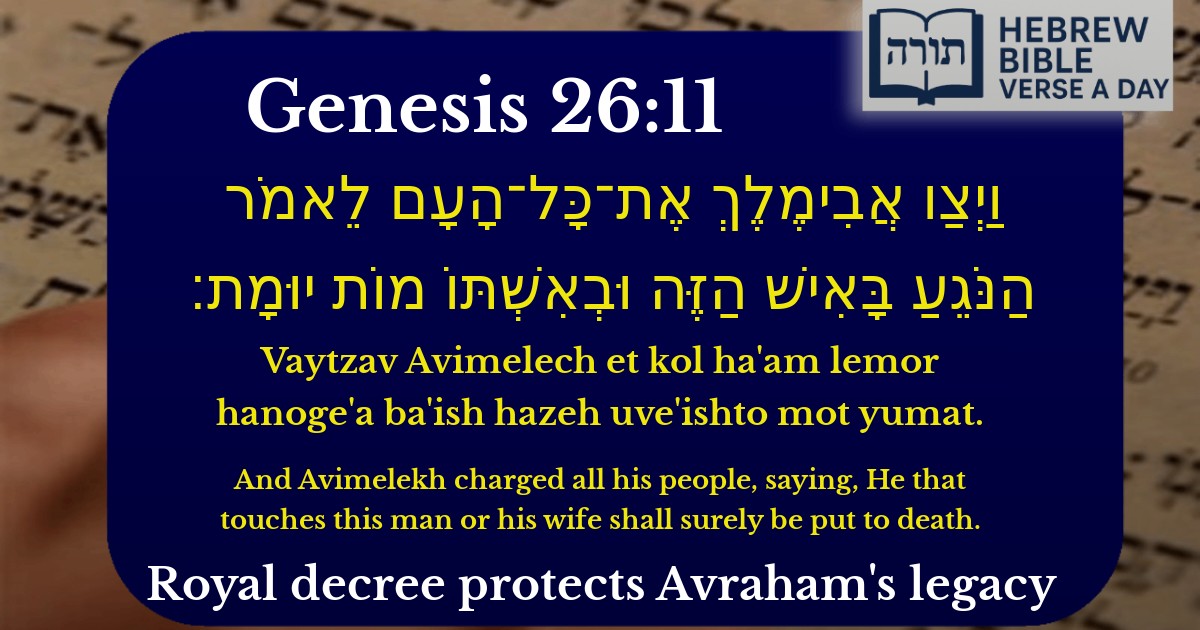Join Our Newsletter To Be Informed When New Videos Are Posted
Join the thousands of fellow Studends who rely on our videos to learn how to read the bible in Hebrew for free!
Hebrew Text
וַיְצַו אֲבִימֶלֶךְ אֶת־כָּל־הָעָם לֵאמֹר הַנֹּגֵעַ בָּאִישׁ הַזֶּה וּבְאִשְׁתּוֹ מוֹת יוּמָת׃
English Translation
And Avimelekh charged all his people, saying, He that touches this man or his wife shall surely be put to death.
Transliteration
Vaytzav Avimelech et kol ha'am lemor hanoge'a ba'ish hazeh uve'ishto mot yumat.
Hebrew Leining Text
וַיְצַ֣ו אֲבִימֶ֔לֶךְ אֶת־כׇּל־הָעָ֖ם לֵאמֹ֑ר הַנֹּגֵ֜עַ בָּאִ֥ישׁ הַזֶּ֛ה וּבְאִשְׁתּ֖וֹ מ֥וֹת יוּמָֽת׃
וַיְצַ֣ו אֲבִימֶ֔לֶךְ אֶת־כׇּל־הָעָ֖ם לֵאמֹ֑ר הַנֹּגֵ֜עַ בָּאִ֥ישׁ הַזֶּ֛ה וּבְאִשְׁתּ֖וֹ מ֥וֹת יוּמָֽת׃
🎵 Listen to leining
Parasha Commentary
📚 Talmud Citations
This verse is not quoted in the Talmud.


Context of the Verse
The verse (Bereshit 26:11) describes Avimelekh, king of the Philistines, issuing a stern warning to his people not to harm Yitzchak (Isaac) or his wife Rivkah (Rebecca). This follows Yitzchak's earlier encounter with Avimelekh, where Yitzchak had presented Rivkah as his sister out of fear for his life.
Rashi's Commentary
Rashi explains that Avimelekh's decree was a direct result of witnessing divine protection over Yitzchak. After discovering that Rivkah was Yitzchak's wife (not sister), Avimelekh recognized that any harm to them would bring severe consequences. Rashi notes that this parallels a similar incident with Avraham (Abraham) and Sarah, showing a pattern of divine intervention protecting the patriarchs.
Rambam's Perspective
Rambam (Hilchot Melachim 9:1) discusses how non-Jewish rulers are obligated to establish just laws. Avimelekh's decree can be seen as an example of a non-Jewish leader recognizing the sanctity of marital bonds and the need to protect righteous individuals, reflecting the Noahide laws against murder and adultery.
Midrashic Insights
Halachic Implications
The Talmud (Sanhedrin 56b) derives from this verse that non-Jews are prohibited from harming Jews, as Avimelekh's decree reflects universal moral laws applicable to all nations. The severity of the punishment ("מות יומת") underscores the gravity of violating this prohibition.
Moral Lesson
This incident teaches the importance of respecting marital sanctity and the protection of righteous individuals. Avimelekh's recognition of Yitzchak's divine favor serves as a model for how nations should treat those under Hashem's special providence.